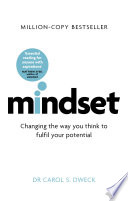Mindset: The New Psychology of Success
By Carol S. Dweck
Introduction
In Mindset, renowned psychologist Carol Dweck reveals a powerful concept that underpins success in all areas of life: the mindset we adopt about our abilities. Her research identifies two contrasting belief systems:
- Fixed mindset: the belief that abilities are static
- Growth mindset: the belief that abilities can be developed through effort and learning
This simple but profound distinction influences how people learn, lead, love, and live. The key message: your mindset shapes your future far more than your talent alone.
Fixed vs. Growth Mindset
Fixed Mindset
- Intelligence and talent are seen as innate
- Focus is on proving ability and avoiding failure
- Challenges are avoided to protect self-image
- Effort is seen as a sign of weakness
- Criticism is ignored or taken personally
- Success of others is threatening
Growth Mindset
- Intelligence and talent can grow with effort
- Focus is on learning and progress
- Challenges are embraced as opportunities
- Effort is a path to mastery
- Criticism is seen as helpful feedback
- Success of others is inspiring
Mindset shapes how people approach goals, feedback, failure, and risk.
The Origins of Mindsets
Dweck describes how mindsets form early in life, often shaped by:
- Praise (e.g., “You’re smart” promotes fixed mindset; “You worked hard” fosters growth)
- Parenting and schooling
- Cultural messages about success and genius
Changing mindset starts with awareness and language.
Mindset in Education
Students with a growth mindset:
- Perform better academically
- Are more resilient after failure
- Seek out challenges and feedback
Dweck emphasizes the role of process praise: praising effort, strategies, and persistence rather than traits.
Teachers and schools can nurture growth mindsets by:
- Valuing learning over scores
- Encouraging risk-taking and grit
- Creating cultures where mistakes are part of learning
Mindset in Business
Corporate cultures often reflect mindset:
- Fixed mindset organizations are political, defensive, and risk-averse
- Growth mindset companies are innovative, collaborative, and adaptive
Growth-mindset leaders:
- Encourage feedback and learning
- Reward progress, not just outcomes
- Lead by example — showing vulnerability, curiosity, and resilience
Dweck cites examples from Enron (fixed) to GE and Microsoft (growth transformation).
Mindset in Sports
Top athletes like Michael Jordan, Serena Williams, and Tom Brady exemplify growth mindset:
- They focus relentlessly on improving
- They view failure as feedback
- They credit effort, coaching, and process — not just talent
Coaches with growth mindsets develop entire teams, not just star players. They value grit, work ethic, and adaptability.
Mindset in Relationships
In personal life, mindset shapes:
- How we handle conflict
- Whether we see people as static or evolving
- Our approach to rejection or criticism
Fixed mindset in relationships leads to:
- Blame, judgment, resentment
- Belief that personality traits (e.g., generosity, patience) are fixed
Growth mindset leads to:
- Compassion, dialogue, and effort to understand
- Belief that people can grow through communication and commitment
Parenting with a Growth Mindset
Dweck offers key advice:
- Praise the process, not the person
- Encourage effort and resilience
- Normalize struggle and imperfection
- Model learning and vulnerability
Children learn mindset by watching how adults respond to success and failure — in themselves and others.
Changing Your Own Mindset
Mindset is not a label — it’s a practice.
Steps to shift:
- Hear your fixed mindset voice — “I can’t do this,” “I’m not smart enough.”
- Recognize you have a choice — how you interpret events is up to you.
- Talk back with a growth mindset voice — “I can learn,” “Mistakes help me grow.”
- Act on the growth mindset — try, reflect, adapt.
It’s not about perfection — it’s about persistence.
Mindset Triggers and Myths
Everyone has both mindsets — what matters is which one dominates.
Dweck notes that:
- Stress, failure, and evaluation can trigger fixed mindset
- Even growth-mindset people have “fixed mindset moments”
She debunks common myths:
- Growth mindset doesn’t mean effort is everything — strategy, feedback, and support matter
- It’s not just about praise — it’s about creating environments of psychological safety and challenge
Mindset in Leadership
Great leaders model a growth mindset by:
- Admitting mistakes
- Seeking feedback
- Believing in the potential of their people
- Promoting continuous learning
They build learning organizations — places where people are empowered to grow, take initiative, and innovate.
Cultural and Societal Mindsets
Entire societies reflect mindset:
- Cultures that glorify genius and innate ability may stifle effort and creativity
- Systems that reward growth create inclusive, resilient communities
Dweck emphasizes that promoting growth mindset at scale requires:
- Education reform
- Organizational change
- Mindset-aware leadership
Key Takeaways
- Mindset shapes how we approach learning, failure, and success.
- A growth mindset fuels resilience, effort, and achievement in all domains.
- Praise, feedback, and culture influence mindset development.
- Growth mindset is a skill — it can be learned, practiced, and strengthened.
- Shifting to a growth mindset opens doors to deeper relationships, higher performance, and lifelong learning.
Mindset is a foundational book for personal growth, parenting, education, and leadership. Carol Dweck’s research-backed framework empowers readers to replace self-limiting beliefs with a mindset of potential, perseverance, and progress.

